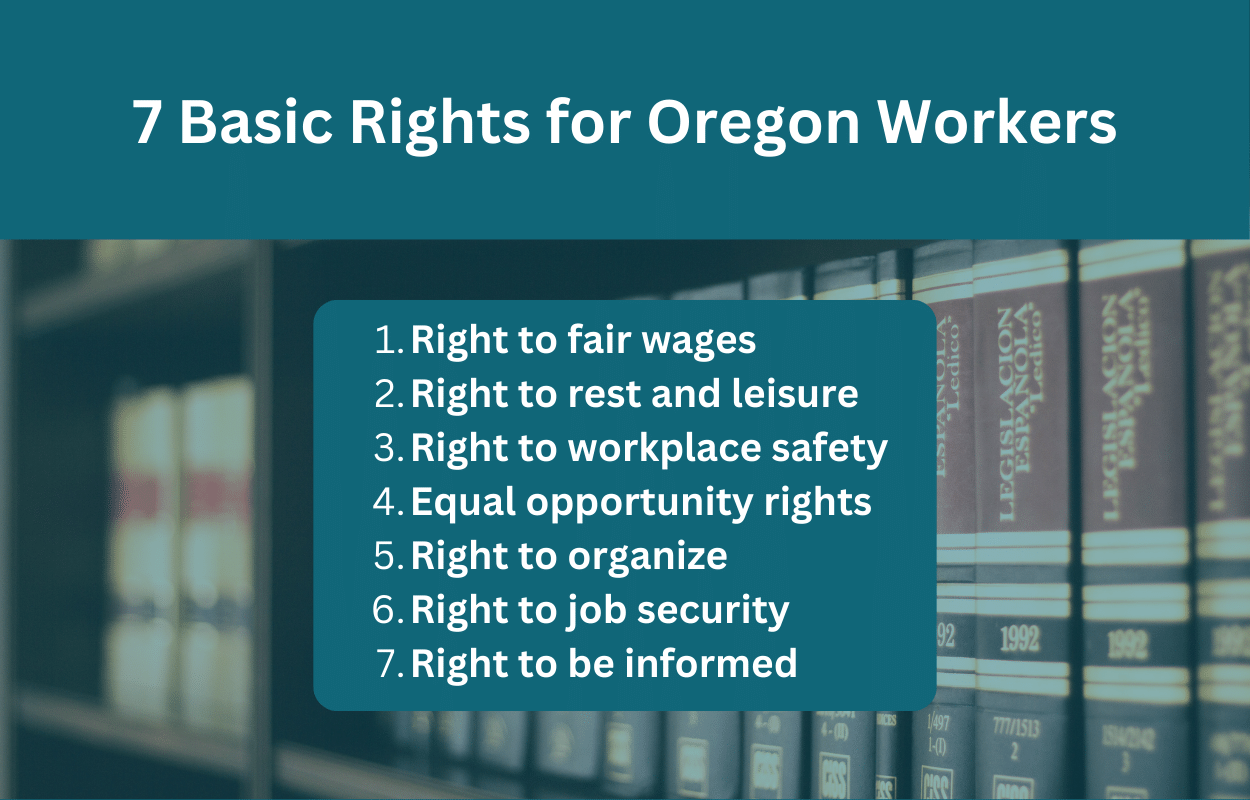As a hardworking individual, it’s crucial that you understand your rights at work. To empower the industrious labor force of Oregon, we crafted this comprehensive guide detailing seven fundamental worker rights in our beloved Beaver State. So if “what are my rights at work” is a question lingering in your mind, look no further as everything you need to know about Oregon workers’ rights is right here!

What are the Core Workers Rights in the State of Oregon?
When discussing core workers’ rights, we’re not just referring to ideals enshrined in international labor standards or declarations or manifestos. We’re talking about concrete obligations set forth by state law that protect Oregon employees’ rights on a daily basis.
In the spirit of simplification and clarity let’s proceed to dissect these seven foundational Oregon workers’ rights into digestible chunks:
- Right to fair wages
- Right to rest and leisure
- Right to workplace safety
- Equal opportunity and non-discrimination rights
- Right to organize and collective bargaining
- Right to job security
- Right to be informed
By illuminating these essential pillars of protection for employees, We hope to provide a valuable resource you can refer to as an employee within the state; empowering yourself through knowledge and ultimately bolstering your working experience level.
Knowing what these core tenants involve will benefit every reader – whether you’re an experienced professional looking for advanced knowledge or someone entering employment life seeking initial guidance with respect to Oregon employee rights. Please remember that mutable laws mean changes can occur from time-to-time concerning “workers’ rights Oregon“, so staying informed is critical! But worry not, because that’s where experts like me come into play—to keep you updated with alterations and implications while providing peace of mind on complex matters surrounding your employment!

1. Right to Fair Wages
One of the pivotal rights for Oregon workers centers around fair remuneration. In this context, ‘fair’ refers to a wage rate that is aligned with state regulations and laws – two elements come into play here: Minimum Wage and Overtime Pay.
Minimum Wage
Under the Oregon minimum wage law, all employees are entitled to earn at least the state’s declared minimum wage. If you’ve ever pondered over “What are my work rights concerning compensation?”, do note that as stated by Minimum Wage: Every worker in Oregon should be earning at least the state’s regulated minimum pay rate. This legislation ensures no worker earns below what is deemed financially sufficient.
These salary rates are annually assessed and pegged against an index tied to the cost of living, it then varies based on specific geographic locations within Oregon — consequently resulting in three distinct regional pay scales.
Although daunting initially, once grasped, understanding these variations becomes quite straightforward and it cannot be overstated how crucial comprehending your lawful entitlements under the Oregon salary law can significantly impact your financial wellbeing.
Overtime Pay
Subsequently, we’re turning our attention towards overtime pay – another integral aspect protected by Oregon salary laws. The primary point to digest here refers to situations where an employee works more than 40 hours per standard working week.
When such instances occur, they’re eligible for overtime compensation set at one-and-a-half times their regular hourly rate — establishing a safeguard preventing employers from exploiting their staff through endless work hours without appropriate reparation.
In relation to this right, monitoring closely enacted procedures outlined by the Oregon wage and hour division is advantageous – empowering us all with up-to-date information helping us uphold these essential protections entrenched within Oregon’s labor legislations.
Altogether, maintaining vigilance about these basic rights and staying informed about the state’s minimum wage, overtime policies, and other labor-related laws can help ensure fair wages for all Oregon workers.
Wage Resources:

2. The Right to Rest and Leisure
As an Oregon worker, one of your indispensable rights pertains to rest and leisure. This means you are entitled to take breaks during work hours, secure sick leave when ill, and benefit from vacation time.
Rest
In the daily hustle and bustle of activities at work sites, rest may often seem like a luxury for many workers. But it is essential to apply the brakes sometimes not just for your safety but also for maintaining high productivity levels. In light of this reality, Oregon law stipulates that all employees should receive proper rest periods. Specifically, organizations should provide a 10-minute paid break for each four hour or longer shift apart from meal times.
Sick Leave
Your health plays a crucial role in determining how effectively you can perform at work. For this reason, employers are expected to offer sick leave provisions as part of their inherent labor rights in Oregon under the Oregon Sick Time Law. This law allows employees to accrue up to 1 hour of sick leave for every 30 hours worked or 40 hours per annum depending on whichever one appears more beneficial.
It’s true; people do fall sick at times without any prior warning signs. On such occasions, having access to sick leave makes it convenient for an employee to recover fully before joining up with colleagues again at work hence fostering optimal workplace conditions conducive for everyone.
Vacation
Flexible personal time off like vacations goes a long way towards enhancing employee wellness while simultaneously relieving stressors commonly associated with burnout scenarios typically seen as counterproductive for both parties involved – employer and employee alike.
Oregon does not have specific laws requiring employers to grant vacation time. However, if an employer chooses to provide it, they must stick with the policies outlined in written agreements or contracts after conferring with their staff upon hire or during employment according to “Oregon vacation time laws.” This section leaves room open-ended regarding how many days off employees can accrue over time, hence bringing about variability from one employer to the next.
By offering such a type of relaxation, organizations are indirectly empowering their human resources towards realizing key societal and organizational objectives including, but not limited to; achieving stronger bonding ties among staff members who gain fresh perspectives on issues following their return from vacations besides prompting higher motivation levels after an enjoyable stretch away.

3. Right to Workplace Safety
Fostering a safe environment for workers significantly depends on the enforcement of standards established by the Oregon Workplace Protection Act. The act defines the framework in which businesses operate and outlines their responsibilities towards their employees, emphasizing an uncompromising stand on workplace safety.
Obligations of Employers
Under this protective legislation, employers are obligated to provide a safe and healthy work environment. This covers several aspects including but not limited to:
- Regular site inspections to spot potential hazards,
- Adequate training regarding safety practices,
- Provision of required personal protective gear at no cost,
- Prompt response to reported safety concerns.
Failure on any of these fronts could have serious legal repercussions for organizations.
Over time, we’ve observed that businesses who prioritize workplace security tend to see better employee performance and lower rates of attrition compared with those who don’t place much emphasis on it.
If you’ve been injured at work, contact an Oregon workers compensation lawyer.
Workers’ Responsibilities
However, as important as employer obligations are, your personal role is equally paramount in maintaining a secure working environment.
Take active steps such as adhering strictly to laid down procedures, using provided personal protective equipment (PPE), participating actively in safety training, and reporting non-compliance or hazardous conditions promptly.
According to Jeff Thompson—an expert in industrial safety—”Safe workplaces are not just about infrastructure or rules; they’re most importantly about culture—a mutual commitment by both workers and employers.”
Lower concerns relate less anxiety leading consequently enhanced productivity—making workspace safety more than a mere legislative requirement—it’s business sense!
Let’s remember: When all stakeholders play their part effectively, we can create a narrative where “work” resonates with “safety,” and compliance becomes synonymous with the Oregon Workplace Protection Act.

4. Equal Opportunity and Non-Discrimination Rights
Individuals who venture into Oregon’s job market find themselves under the robust umbrella of various state laws, collectively known as Oregon employment laws. Notably, these legal statutes are designed to ensure equal treatment of all employees and job applicants, regardless of a diverse range of factors such as race, gender, age, religion, disability status among others.
Enforcing Protection Against Discrimination
As an integral part of Oregon Employment Laws, specific legislation enforces the policy of equality in workplaces across the state.
According to reliable data gathered from the Bureau of Labor and Industries, civil rights laws in Oregon retain potent protections for workers against discrimination based on numerous protected classes including race, color, nationality or national origin.
Addressing Various Forms Of Discrimination
Discriminatory grievances are not confined to people being treated differently because they belong to a particular group. According to Oregon’s workplace regulations; discrimination also encapsulates cases where employers establish policies or practices that appear neutral but disproportionately disadvantage certain groups. Such indirect forms of discrimination hold equal weight when assessing violations in workplace standards.
Moreover, annotating this broad specter coverage is indeed essential because it delineates more visibility into what constitutes discriminatory practice as per Oregon Employment Law.
Introducing Remedies for Discriminated Workers
It’s worth mentioning here that if you experience any kind of discrimination at work—for instance, harassment from colleagues—it’s not just against your employer’s policies; it’s illegal under state law. Diverse remedial avenues exist within these laws such as lodging complaints with regulatory bodies like the Bureau of Labor and Industries or seeking restitution through judicial means in courtrooms.
Remember though that treading down either path requires a deep understanding about protocols and timelines stipulated by relevant governing authorities in order to properly lodge your claims effectively.
In light of this conversation, knowing your rights is only the first step; vindicating them is just as important. It’s essential to make sure that you are treated fairly, in line with Oregon employment laws, and know what actions to take if you believe your rights have been violated.
Equal Opportunity and Non-Discrimination Resources:

5. Right to Organize and Collective Bargaining
Are you keen on understanding what your work rights are in reality? Among the vital things that ought to spring up in your mind as a worker in Oregon is the right to organize or create labor unions as well as engage in collective bargaining sessions. This provision abides by both federal laws and state stipulations, granting employees more freedom and control over their workplaces.
However, having this privilege doesn’t explain it all; let’s break it down.
The Backbone of Labor Unions
The formation and recognition of an independent union is first on the list when one thinks about his or her fundamental rights at work under this subject matter. You may ask yourself why is this so significant — well, unions stand as a power source for employees, providing them with a platform to fight for their general interests. Having these bodies bargain collectively on behalf of workers enhances job security while also ensuring that matters related to wages, working conditions, benefits among other elements receive undivided attention.
Henceforth, Oregon statutes solidify the protective barrier around employees from exploitation by including provisions such as prohibiting employers from interfering with employee unions activity or membership and barring employers from refusing negotiations or dealings with said labor organizations.
Advancing Through Collective Bargaining
Certainly not taking the back seat when investigating ‘what are my work rights,’ collective bargaining serves a critical function in achieving fair working terms between employers and employees via trade unions. It represents a process where wage scales, policies regarding employment corrections/promotions/transfers/rights & responsibilities/duties along with others, are jointly agreed upon through dialogue and negotiation.
This participative process has been widely acclaimed because of how it reinforces mutual respect amongst the parties involved without bias. Whether you happen to fall into the category of non-supervisory staff members within private businesses or even public sector jobs (apart from specific exceptions), you all attain equal footing space during these dialogue exercises. In this way, an environment of shared decision-making fosters the promotion of individual worker interests and the realization of workplace harmony.
Apprenticeship Programs: Apprenticeship programs offer high-quality on-the-job training and classroom instruction for workers seeking strong careers.
In essence, as an Oregon employee or anyone asking ‘what are my work rights,’ this knowledge acts as power in your hands, enabling you to leverage your strengths not merely as an individual but within a formidable unit aimed at continuous improvement in working conditions.
So go ahead — understand what it implies, utilize this power when necessary and indeed flourish industriously in all your delegated task undertakings!

6. Right to Job Security
According to the Oregon employment laws, every worker in this region has an essential right to expect job security. This implies that unlawful terminations are forbidden and employers must adhere to specific protocols if dismissals become inevitable.
Let’s go in depth about how these rights safeguard workers’ job stability through a closer investigation of three primary aspects: Anti-At Will Employment, Redundancy Rights, and Whistleblower Protections.
Anti-At-Will Employment
Oregon is predominantly an “at-will” state which means an employer can usually terminate an employee for any reason unless there is a contract stating otherwise. However, it doesn’t mean employers have free rein to fire at will without restrictions.
Employers cannot let go of employees on illegal grounds such as discrimination based on race, color, national origin, sex (including pregnancy), age (40 or older), disability or genetic information. Likewise, employees cannot be fired for exercising their legal rights such as filing a complaint against workplace injustices or participating in an investigation into alleged violations of Oregon employment laws.
Redundancy Rights
When layoffs occur due to economic reasons or company restructuring, certain procedures need to be followed under the Worker Adjustment and Retraining Notification Act (WARN Act). Under this federal law, companies with 100 or more full-time workers must provide at least a 60-day written notice before initiating mass layoffs or closing down plants affecting 50+ staff members
Workers affected by redundancy also have rights. For instance; they may lay claim to severance pay or have access to alternative positions within the same company depending upon individual contracts and labor union agreements.
Whistleblower Protections
Employees who disclose information about illegal activities occurring within their workplaces are entitled to protective measures under Oregon’s whistleblower laws. These laws protect whistleblowers from retaliation by employers such as demotion, harassment or wrongful termination.
In light of data showing 91,900 unemployed residents in Oregon in 2022 along with an additional 49,300 workers employed part-time for economic reasons; understanding these rights becomes even more vital. It illustrates that despite a relatively stable economy, substantial threats to job security still exist, underlining the importance of these protective measures.
In keeping these rights at fingertips and seeking legal counsel whenever they feel their rights are being violated can help employees navigate through complexities and uncertainties surrounding their job security effectively.
With some knowledge about Oregon employment laws on hand, you gain confidence knowing that you are protected by law. This not only ensures your well-being but also encourages productivity and healthy relationships within your workplace.
Right to Organize Resource:

7. Right to be Informed
One essential mandate of the Oregon employee laws is the right to be informed. Workers have a basic right to understand their employment provisions, time-off rules, workplace safety standards, and grievance procedures among other vital information.
To start with, employers in this Pacific Northwest state are required by law to clearly inform their workers about their rights and responsibilities. This includes providing written documents detailing conditions of employment such as hours expected to work and wages agreed upon. Such documentation should be provided at the beginning of an individual’s service tenure and updated as necessary when changes occur.
Moreover, it’s imperative that all employees are given up-to-date health and safety training appropriate for their function in the organization. And if there’s a threat that could impact their well-being or productivity, they have an absolute entitlement to be appropriately informed. I can’t emphasize enough how crucial it is for employers to establish understandable communication channels so that employees can voice out concerns without fear of reprisal.
Another notable point under this principle entails unambiguous elucidation of benefit plans available within the company – health insurance options, retirement plans like 401(k) or pension systems just but to mention a few.
Finally yet importantly, Oregon laws further advocate for clear-cut dissemination of details regarding avenues available for raising grievances- both internally (through supervisors or human resource personnel) and externally via platforms like the Bureau of Labor and Industries which enforces labor laws and accepts anonymous tips for investigations.
In essence:
- Employers must provide clarity on conditions of employment.
- Workers ought to receive safety training pertinent to their roles.
- Comprehensive enlightenment on benefit plans mustn’t skip any member.
- Information concerning grievance reporting mechanisms needs to reach each worker.
Has your rights as a worker been breached? Contact an Oregon employment lawyer like Meyer Employment Law here.
Discrimination Law
Read more about Oregon discrimination law.




